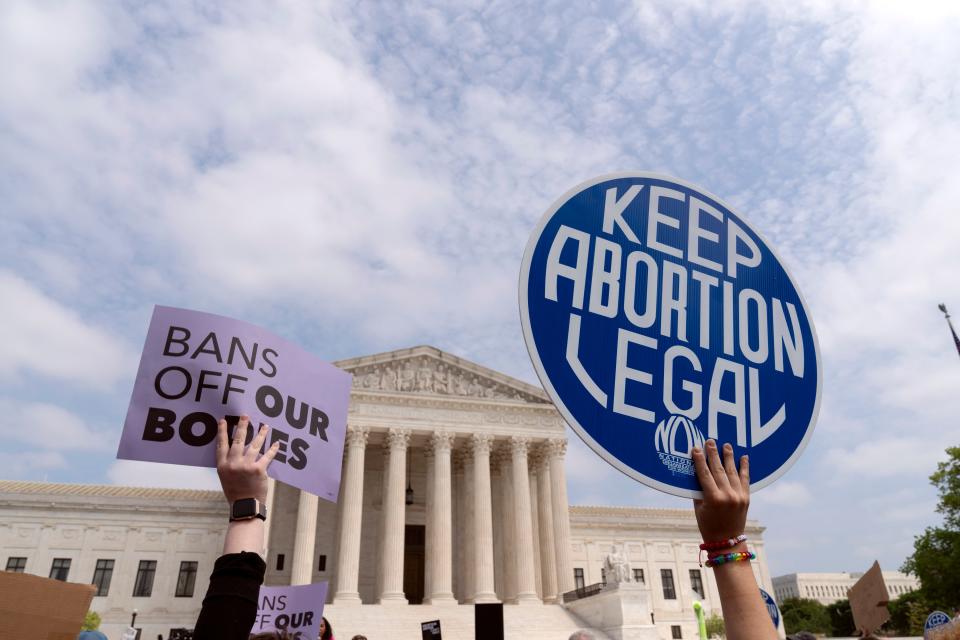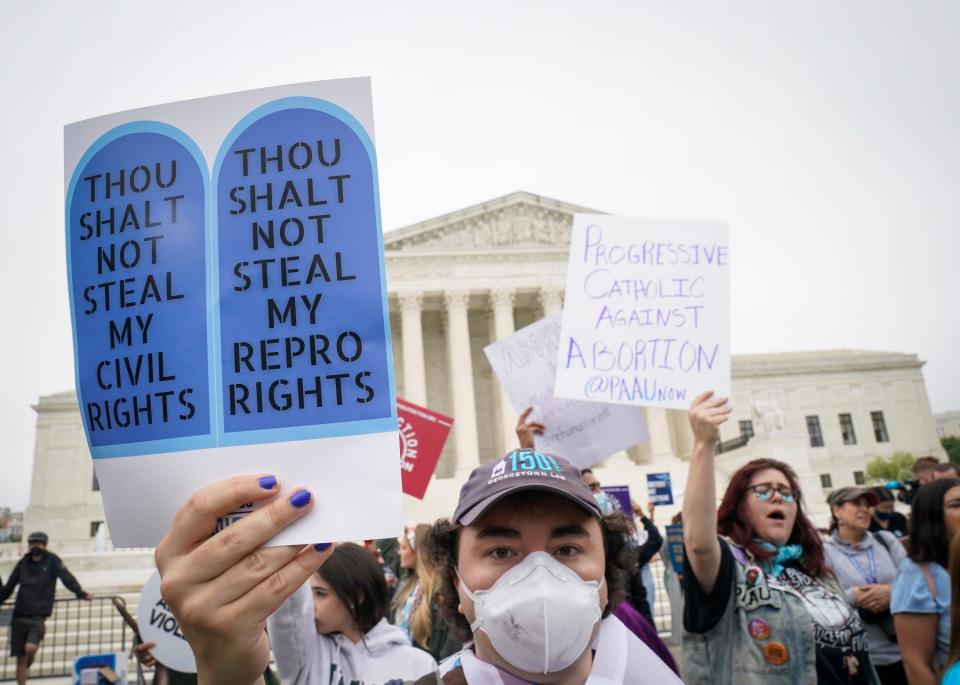Leak of abortion opinion creates existential crisis for Supreme Court as trust in government plummets
- Oops!Something went wrong.Please try again later.
- Oops!Something went wrong.Please try again later.
WASHINGTON – The stunning breach of Supreme Court protocol that arrived in the form of a leaked abortion opinion threatened to undermine the court's carefully curated above-the-political-fray image at a time when faith in government has plummeted.
At the very least, the draft opinion from Associate Justice Samuel Alito that lays out a case for striking down the landmark 1973 Roe v. Wade decision thrust the high court into the middle of this year's midterm election – shifting the political landscape in uncertain ways over the nation's most intractable culture war issue.
But a wide range of observers feared the leak raised more profound questions about trust in the Supreme Court and its ability to distinguish itself from the other branches of government, where leaks intended to influence or punish those in power are common. Chief Justice John Roberts has, throughout much of his tenure, sought to insulate the court from the kind of raw partisanship that is pervasive in the rest of Washington.
"It does feed the perception of the court being yet another dysfunctional, partisan institution," said Neil Siegel, a professor of law and political science at Duke University. "I don’t think our problem as a country is that we don’t have enough of them."
Alito's 98-page draft laid out the conservative case for overturning Roe, the decision that established a constitutional right to abortion and that has controlled how Americans have viewed reproductive rights for nearly five decades. In some ways, the opinion wasn't a surprise: The court has sent many signals about its intentions on abortion.
"Roe was egregiously wrong from the start," Alito wrote in the draft, hailed by anti-abortion groups and decried by those who support abortion rights.
But the leaking of the draft itself was unprecedented, prompting speculation about the motivations of the leaker and recriminations from members of Congress directed at individual justices. Amid the backlash, including protests outside the court building, the Supreme Court confirmed the document was authentic but said it wasn't final.
"To the extent this betrayal of the confidences of the court was intended to undermine the integrity of our operations, it will not succeed," Roberts tried to assure Americans in a statement in which he also announced the court would launch an investigation into the leak. "The work of the court will not be affected in any way."

Fallout from the revelation might have been more limited if it had come in some other case. As it was, the piercing of the Supreme Court's veil of secrecy happened in its highest-profile case in years – and on an issue that has galvanized conservatives for generations and that was a key factor in President Donald Trump's election in 2016.
Former Indiana Sen. Evan Bayh, a centrist Democrat, said the fracturing of the court goes way beyond Roe and is the culmination of deeper and troubling trends.
"Increasing polarization of the public has led to the increasing polarization of our elected officials, which has led to the pursuit of power at any price," Bayh said. "And the court is the ultimate acquisition of power, because those are lifetime appointments, and are very hard to overturn by any one election."
Tobias Barrington Wolff, a professor at the University of Pennsylvania Carey Law School, said he wouldn't equate what happened at the Supreme Court with the kinds of raw political machinations common in the other branches. But it is troubling, he said.
"This is a frontal assault on the integrity of the Supreme Court's decision-making process," Wolff said. "What this release of the draft of the opinion looks like from the outside is an attempt in some way to affect the decision-making processes of the court by putting outside pressure on the justices."
At issue in the case is a Mississippi law that bans most abortions after 15 weeks of pregnancy. The ban directly contravened Roe and a subsequent case, Planned Parenthood v. Casey, that said people have the right to an abortion until viability, the point at which a fetus can survive outside the womb – or roughly 24 weeks.

Even though the Supreme Court has come under increasingly intense political pressure in recent years – and even though polls show an erosion of trust has followed – the justices nevertheless have tended to be viewed more favorably than those leading the other branches of government. Though the court is undeniably conservative, it repeatedly rebuffed Trump's effort to overturn the 2020 election, and it sided with congressional efforts to dig into the Jan. 6 attack on the U.S. Capitol.
At the same time, the court's 6-3 conservative majority sided with the Republican position on voting rights, religious freedom and some COVID-19 restrictions – rulings that drew howls from the left. Taken together, Roberts' incremental approach to the law seemed to put the court in the middle of a nation rushing to the extreme left and right.
Public faith in government overall has reached historic lows, polls show. Only about one-quarter of Americans said they can trust the federal government to do what is right "just about always" or "most of the time," according to a Gallup poll last year.
While leaks at the court are extremely rare, they do happen. Most recently, the court was thrown into controversy after an NPR report revealed that Supreme Court Associate Justice Sonia Sotomayor did not feel safe near other justices who were unmasked during the pandemic. Roberts had asked the justices to wear masks in the courtroom, NPR reported, but Associate Justice Neil Gorsuch had declined to do so.
At the time, the court pushed back on the report with a series of highly unusual statements – including one from Roberts asserting that he "did not request Justice Gorsuch or any other justice to wear a mask on the bench." The reaction from the court seemed to quiet the controversy and speculation about private disagreements among the justices.
Roberts will have a far more difficult time putting the leaked draft behind him.
"I don’t think it helps anyone – it hurts everyone," said Josh Blackman, a law professor at South Texas College of Law Houston. "It creates all these opportunities for advocates on both sides of the litigation to pressure" the court.
That pressure began in earnest on Tuesday. In Congress, Democrats and Republicans blamed each other for dragging the Supreme Court through the political muck. Dozens of Democratic senators gathered on the front steps of the Capitol to denounce what Senate Majority Leader Chuck Schumer, D-N.Y., called a "dark and disturbing day for America."
More notable were the accusations of double-dealing from the two Senate Republicans who support abortion rights and backed some of Trump's nominees.
Sen. Susan Collins, R-Maine, said the leaked draft opinion was "completely inconsistent” with what Gorsuch and Associate Justice Brett Kavanaugh said about Roe v. Wade during their confirmation hearings and in private meetings with Collins.
Sen. Lisa Murkowski, R-Alaska, likewise said that "comments were made to me and to others about Roe being settled and being precedent."
The draft opinion has "rocked my confidence in the court," Murkowski said.
Other Republicans, however, charged that Democrats were the ones playing political games by trying to pressure the court not to overturn Roe. Senate Minority Leader Mitch McConnell, R-Ky., called the leak an attack on the court's independence.
"By every indication, this was yet another escalation in the radical left's ongoing campaign to bully and intimidate federal judges and substitute mob rule for the rule of law," he said.
Alan Abramowitz, an Emory University professor who has written two books on increasing polarization, said the Supreme Court is a reflection of what has happened in the rest of government.
"The Supreme Court is deeply divided along partisan and ideological lines just like the elected branches and, for that matter, the engaged part of the electorate."
This article originally appeared on USA TODAY: Draft abortion opinion: Leak raises questions about court, experts say

